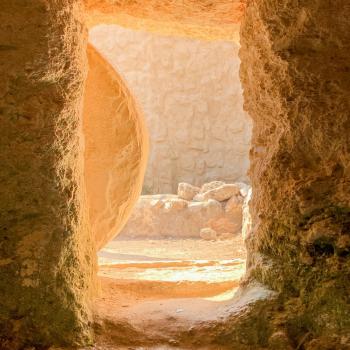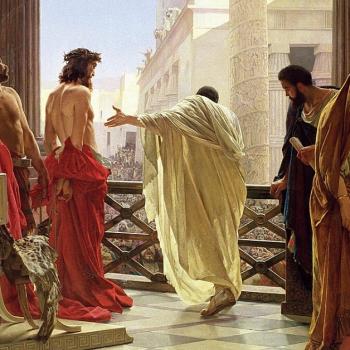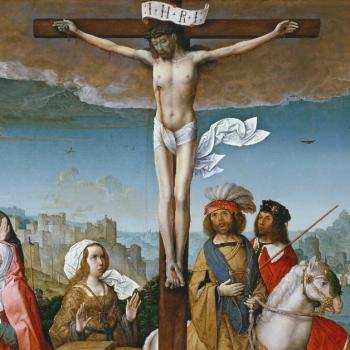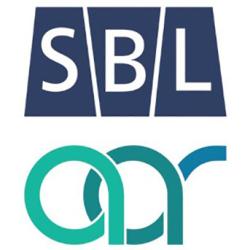Dale Tuggy makes some excellent points in his recent blog post, “Where did Jesus claim to be God?” He writes:
What bothers me the most is that this whole strategy perversely ignores the explicit, central, repeated, emphasized point of all the gospels, which is Jesus is the Messiah, God’s anointed. The assumption here is that God’s anointed isn’t God himself. God has no need to send, authorize, endorse, or empower himself. Anyway, when you interpret a book, you go with the clear thesis when there is one; you don’t hunt for hints of a claim that seems to contradict the explicit thesis. But this is what many evangelicals do. But these books are very straight up in what they assert; there’s no hidden message, as with prophetic and visionary writings, no secret gnosis only hinted at or told to the inner circle only. But tradition wreaks havoc here. People selectively hint-hunt, and ignoring obvious counter-evidence in the texts.
Of related interest, both Mike Kok and Daniel Gullotta mentioned the session on Mark’s Christology that will be part of the SBL annual meeting in November. I will give the details with abstracts below, courtesy of Mike. But let me first also point out that Daniel Kirk has been blogging about the book he is working on about the human Jesus in Mark’s Christology, which is the focus of his paper in the session.
Theme: “Who do you say I am?” Markan Christology: Jewish Prophet or Cosmic Lord?
The session will continue the debate over Markan Christology. Is Jesus characterized entirely within the human plane, for example as a prophet? Or does Mark present Jesus as somehow cosmic, divine? Presentations consist of a short summary followed by extended discussion among seminar members, and finally a general discussion among all present. Papers are sent to formal members to be read in advance. If you are not a member but wish to obtain copies of papers in advance, contact the seminar chair, Kelli O’Brien, after November 1.J. R. Daniel Kirk, Fuller Theological Seminary
Idealized Human or Identified as God? A Narratological Assessment of Mark’s Christology in Conversation with Jewish Precedents (10 min)
Mark begins his Gospel with clear indications that the character and story of Jesus are to be interpreted in light of scriptural precedents. This cue to his readers provides strong reasons for assessing Mark’s Christology against early Jewish understandings of God and how God’s work might or might not be shared with other agents. In light of this, proposals by Larry Hurtado and Richard Bauckham have isolated key markers of God’s unique identity, recognized ways that such markers are ascribed to Jesus, and concluded in favor of an early divine Christology that might well be called proto-Nicene. In sustained conversation with these proposals (and the work of those who have followed them), this paper will engage in a narratological approach to Mark’s Jesus from the perspective of an informed Jewish reader in order to argue that Mark’s high Christology is best captured under the rubric of “idealized human figure.” First, the study will show how the crucial titles son of God and son of man develop in concert with each other and with the disclosure of Jesus’s mission to the reader. Together these key markers of Jesus’s identity show him to be a representative, suffering, and to-be-glorified ruler. Second, it will demonstrate how Jesus’s mighty deeds, including his power over the waters, work together to demonstrate that Jesus is the man specially empowered by God to rule the world on God’s behalf. Third, it will assess the possible divine connotations entailed in Mark’s allusions to the scriptures of Israel. In each instance, Jesus is in some sense identified with God; however, the paper will make the case that the significance of this conjunction is not to identify Jesus as God, but to identify Jesus as the idealized human figure through whom God is enacting dominion over the world.
Discussion (20 min)
Delbert Burkett, Louisiana State University
Mark’s Jesus: Spirit-Filled Charismatic and Deified Human (10 min)
The present paper addresses the question of whether Mark’s Jesus is in some sense divine or identified with God. Interpreters of Mark’s gospel commonly see Mark as representing a “low” christology, in which Jesus is a human being, not a divine being. This perspective, however, continues to be challenged by interpreters who find in Mark a “high” christology, in which Jesus is a divine being or in some way identified with God. The present paper examines this issue. It supports the thesis that Mark’s Jesus is a human being to whom God grants divine power and prerogatives. It supports this thesis by paying attention not only to the narrative world of Mark’s gospel but also to its cultural and religious context in Second-Temple Judaism, the Greco-Roman world, and early Christianity. The examination proceeds diachronically in the order of Mark’s narrative, so that Mark’s christology is unfolded in the order in which Mark presents it as well as the order in which a reader encounters it. In the process, the paper examines aspects of the story in which some interpreters have found Jesus identified with God–such as Jesus’ claim to forgive sins, his ability to calm a storm, and his power to raise the dead–and it finds this identification unjustified. It concludes that two moments in Jesus’ story are key for understanding his relation to God. The first is his baptism, at which he receives the Spirit of God. This event must be understood in the context of Jewish traditions about the Messiah and early Christian traditions about baptism. At this point, the man Jesus is anointed as the Messiah, adopted as God’s son, and imbued with the power and prerogatives of God. The second is his ascension, at which he sits at the right hand of God. This event must be understood in the context of Greco-Roman traditions concerning apotheosis. At this point, God bestows on Jesus a place of authority in the divine realm and shares with him his own name. In Mark’s christology, a god does not become a man, but a man becomes a god.
Discussion (20 min)
Michael Kok, The King’s University
Adoptionist Interpretations of Mark’s Gospel among Ancient and Modern Readers (10 min)
While scholars are cognizant about not importing anachronistic conceptions about ontology back into first century Christian texts, proponents of an “early high Christology” insist that the earliest Christ followers envisaged Jesus as sharing in the divine identity (Bauckham 2008), as relating to his followers according to the pattern of Yahweh’s relationship with Israel (Tilling 2012), or as receiving cultic worship in a distinctive binitarian devotional pattern (Hurtado 2003). In contrast, Michael Peppard’s ground-breaking analysis of Markan Christology displays how biblical scholars continue to be influenced by Platonic categories and re-contextualizes divine sonship against the backdrop of imperial adoption practices (2011). The Roman imperial parallels he draws complement the scholarship on the intertextual links of Mark 1:9-11 with other biblical texts (e.g., Psalm 2:7), texts that suggest that Mark framed the baptism of Jesus as the moment when Jesus was elected or anointed for his messianic office as the Davidic king and the deity’s son. Although some theologians label adoptionist Christologies as “low” from the vantage point of the Nicene Creed, Peppard rightly protests that the application of this metaphor by the early Christ congregations to the exaltation of Jesus was a remarkable development in light of how adoption was often the means by which complete control of the Empire was transferred to the most powerful benefactor in the Roman world (2011, 95; cf. Ehrman 2014, 231-232). Even those Markan episodes in which Jesus seems to carry out a divine prerogative such as walking on water (Mark 6:47-52; cf. Job 9:8; Psalm 89:9) can be interpreted as Yahweh extending his authority to the empowered human representatives who rule on his behalf (cf. Crossley 2010, 140-141; Kirk and Young 2014). I will argue that the Markan Jesus is the authorized agent of the god of Israel who has been chosen to rule after the impending eschatological reversal. Further, based on the findings of my monograph on the second canonical Gospel’s early reception history (Kok 2015), I will argue that second century Christians who held to a “possessionist Christology” (Goulder 1994, 108-113, 130-134) or a “separationist Christology” (Ehrman 1996, 140) saw an ally for their Christological convictions in Mark’s narrative, though their questions about the union of the divine Christ with the human Jesus or whether a divine being could suffer need to be kept distinct from the concerns of the first century Gospel writer.
Discussion (20 min)
Rikk Watts, Regent College
Mark’s “Dappled” Christology. (10 min)
This paper will begin by outlining the current state of play concerning Markan Christology. It will give particular attention to the determinative role of assumed cultural—Graeco-Roman and Jewish—and literary horizons within which Mark’s account of Jesus is read. It will propose that from within these perspectives Mark offers a “dappled” Christology (after Hopkins, “Pied Beauty;” cf. Cartwright, The Dappled World, i.e. resistant to an easily observed elegant uniformity) which, from Mark’s point of view, finds its unique and integrative origin in the “genius” of the Jesus he presents. The paper will conclude with a brief proposal tracing the narrative structure of Mark’s “dappled” Christology within the interpretative horizons he himself indicates.
Discussion (20 min)
General discussion, open to all (30 min)
















